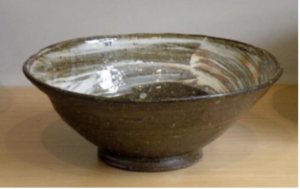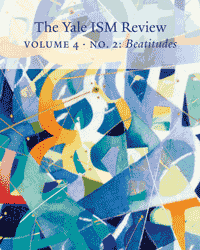Hyuk Seonwoo
Blessed are the pure in heart, for they will see God.
 For the last seventeen years, Zion Korean United Methodist Church in Warwick, Rhode Island has celebrated Holy Communion every Sunday. Immediately before communion, all of the worshippers are invited to sing the hymn, “Change My Heart, Oh God,” in either English or Korean (and sometimes in Spanish).
For the last seventeen years, Zion Korean United Methodist Church in Warwick, Rhode Island has celebrated Holy Communion every Sunday. Immediately before communion, all of the worshippers are invited to sing the hymn, “Change My Heart, Oh God,” in either English or Korean (and sometimes in Spanish).
This is the text:
Change my heart, Oh God, make it ever true.
Change my heart, Oh God, may I be like you.
You are the potter, I am the clay,
Mold me and make me, this is what I pray.
Change my heart, Oh God, make it ever true.
Change my heart, Oh God, may I be like you.[1]
When we are before Christ’s Table, we are reminded that we are clay jars, earthen vessels made by the Master Artist’s hands. We are fragile but blessed: we are wounded, offended, and foolish, just like everyone else; but, at the same time, we are faithful, resilient, and persistent in sharing and living out the gospel of Jesus Christ. We are clay jars that are weak but which become strong through the empowering presence of the Holy Spirit, who helps us to keep our eyes and hearts open to see the treasure that dwells and shines within us.
As we celebrate weekly Communion, we are continually nurtured to be formed and transformed into a disciple-making congregation: “disciple-making” is a shared vocation that strongly connects United Methodist congregations with one another. When we join in Communion, we are especially invited to grow in “loving Jesus, honestly repenting of our sin, and seeking to live in peace with one another.”[2] We do not see this as a condition for the reception of Communion but as a constant invitation to the growth of faith. We practice open communion in which all are welcome to the Lord’s Table!
When the bread is taken, blessed, broken, and given, we remember God’s self-giving love embodied in and through Jesus’s life, death, and resurrection. Through this remembrance, anamnesis in biblical Greek, we are invited to see, taste and experience the living presence of Christ in the present. Along with this fundamental remembrance of Jesus, we also experience Jesus’s feeding the crowds, his breaking the bread at the Last Supper and at the dinner table in Emmaus. In this way, Holy Communion becomes a mirror image of Jesus’s ministry for God’s reign in the midst of outcasts. In Christ’s loving presence, our ongoing journey of faith is also guided by the vision of God’s final banquet, in which divine love, justice, and reconciliation are full-blown.
Sometimes, however, the invitation to live out or echo God’s reign, God’s self-giving love, or discipleship becomes too big, heavy, or abstract to be understood or carried. Receiving bread and wine (or grape juice), therefore, we also remember Jesus’s tears, struggles, and suffering on the cross. We are reminded of our own weakness and brokenness; as clay jars who cherish the treasure that is Jesus (2 Cor. 4:7), we are invited to embrace our own limitation in the context of God’s abiding grace. At the end of Communion, we are called to “give ourselves for others” in the heartening presence of the Holy Spirit. We are broken but empowered.
We are clay jars that are weak but which become strong through the empowering presence of the Holy Spirit, who helps us to keep our eyes and hearts open to see the treasure that dwells and shines within us.
During Communion, each verse of the hymn, “God Who Created All,” which has a Korean traditional tune, is sung as part of the Great Thanksgiving.[3] We also sing hymns from many different cultures, such as “Let Us Talents and Tongues Employ,” whose tune comes from a Jamaican folk melody.[4] Multicultural musical instruments are also used, and images from various cultures are projected onto a screen using PowerPoint slides. By being exposed to culturally diverse hymns and images, we are invited to experience the varied gifts of the Holy Spirit that are embedded and embodied in different cultural, social, and historical contexts.
Children and youth join Communion every Sunday, too, making our worship service not only culturally-conscious, but also intergenerational: “Come, the table is ready!” When children come forward to receive the bread and grape juice, the presiding minister and assisting ministers bend down, making sure they are on eye-level with the children. Children and youth see, hear, and taste God’s loving grace through the presence of Jesus and the care extended to them by their parents’ generation. Culturally conscious images and hymns help children and youth to acquire self-respect and cultural confidence as Korean-American Christians. We believe that the more children (and adults, too) develop a sense of self-worth in God, the more they understand and appreciate the sanctity and preciousness of others and of all God’s creation.
The institution narrative (“Take, eat; this is my body which is given for you . . . . Drink from this, all of you; this is my blood of the new covenant, poured out for you and for many for the forgiveness of sins. Do this as often as you drink it, in remembrance of me”) and the epiclesis (invocation of the Spirit) invite people to experience the presence (or at least the nearness) of Jesus tangibly so that they will be open to the transforming power of the Holy Spirit. As an immigrant congregation, members of which and others who attend our worship services come from many different denominational backgrounds, or no Christian backgrounds, we continually invite people to meet the living Christ at the Table and beyond. United Methodists believe that Jesus Christ is “truly present” in Holy Communion.
Holy Communion also makes us look into our “inside world” more deeply.
Members of the Zion congregation have gratefully affirmed that the weekly celebration of Holy Communion has changed them to “become more deeply aware of the abiding grace of Jesus Christ,” “learn the central meaning of worship and communal lives of faith,” “experience a sense of belonging in the body of Christ,” “grow closer to God and God’s people,” and so on. Children and youth also experience that they are loved by Jesus and the community of faith; they feel that they are invited to join a family dinner.
Holy Communion has led the Zion community of faith to see God’s acts beyond the sacramental ritual itself. Just like the bread on the table, as the beloved children of God, we are invited to imagine that we are “called to become bread for the world: bread that is taken, blessed, broken, and given” as Henri Nouwen suggests.[6] Holy Communion keeps reminding us who we are as members of the body of Christ individually and collectively; we are called to embody Christ’s self-giving love instead of existing as a self-serving organization. In order to invite people to understand and live out Christ’s Table in the world and in their daily lives, from time to time we introduce some encouraging quotes along with multicultural images that are projected onto the screen:
“Participation in the Eucharist bears fruit in the world in attitudes and actions of personal and social holiness.” (This Holy Mystery)[7]
“The Christ revealed in water, bread, and wine is a breaker of barriers among people, a builder of community, a champion of the poor and marginalized, the Prince of Peace, and the advocate of justice. The living out of our identity as a people of the sacraments requires us to join with Christ in this work.” (Gale C. Felton)[8]
“The eucharist is an act of thanksgiving consisting of a covenantal gesture of breaking, sharing, and pouring out one’s life for others. To eat sumptuously while others starved was antieucharistic and antiecclesial, ‘a sin against the body of the Lord.’” (Aloysius Pieris)[9]
“Eucharist forms us in thanksgiving, focuses our sense of God’s presence in all of life, prepares us for faithful discipleship, and renews the body of Christ.” (Ruth C. Duck)[10]
As a part of our community engagement, often called the Table of Life in the world, we have worked together with the Rhode Island State Council of Churches (RISCC) partaking in intercultural, ecumenical and interfaith interactions and prayer actions for social justice, reconciliation, “glocal” health, and the like.
Holy Communion also makes us look into our “inside world” more deeply. As one of Matthew’s beatitudes indicates, we are invited and nurtured in order to “get our inside world—our mind and heart—put right,” so that “we can see God in the outside world.” (Matt. 5:8, MSG). This modified translation of the seventh beatitude, “Blessed are the pure in heart, for they will see God” (NRSV), expresses what Zion congregants would like to become day by day. We pray that our “inside world” will be constantly transformed by Jesus Christ who is truly present in our weekly celebration of Holy Communion and in our daily footsteps. In this way, our mind and heart continue to be cultivated as the place where we deeply experience our belovedness, rootedness in God, and genuine gratitude (Eucharist—eucharistia in Greek—means giving thanks to God, especially in the New Testament[11]).
We also recognize that our lives are woven in and inter-connected with a bigger jar of clay, the entire creation.
In the process of being transformed, we become more aware of God’s grace everywhere and all the time: when we meet people, eat foods, enjoy nature, and so on. Ordinary things, people, our experiences, communities, and creation can be sacramental when they become “channels” that reveal the invisible God’s grace and presence. Just as Jesus “is the reflection of God’s glory and the exact imprint of God’s very being” (Heb 1:3),[12] we too would like to become sacramental, reflecting God’s self-giving love as we participate in God’s ongoing present and eschatological acts for the reign of God.
We are the clay, and God is our potter (Isa. 64:8). As Paul and his colleagues said that they were like clay jars that are weak and easily broken (2 Cor. 4:7), we admit that we are clay jars too. We also recognize that our lives are woven in and interconnected with a bigger jar of clay, the entire creation. Since all lives created from the clay of this earth are easily cracked and broken, we ask for God’s help to change our hearts so that we can be more gentle and compassionate to each other and to all lives, especially to those who are weak, marginalized, and victimized. Although it may be hardly noticeable, we may water the flowers through our broken selves, which also become the ways through which the light of the Good News shines forth. Holy Communion is a time for us to lay down our hearts and lives before God, so that God will heal us, make us whole, and lead us to live as sacramental jars of clay. May God bless and keep us so that our journey constantly shows God’s hidden face. We walk that journey daily, on common and holy ground![13]
 Hyuk Seonwoo is an ordained elder in the United Methodist Church, serving as pastor of Zion Korean United Methodist Church in Warwick, Rhode Island. He earned Ph.D. in Liturgical Studies from the Graduate Division of Religion at Drew University.
Hyuk Seonwoo is an ordained elder in the United Methodist Church, serving as pastor of Zion Korean United Methodist Church in Warwick, Rhode Island. He earned Ph.D. in Liturgical Studies from the Graduate Division of Religion at Drew University.
[1] “Change My Heart, Oh God” (No. 278) in Come, Let Us Worship: The Korean-English United Methodist Hymnal (Nashville: The United Methodist Publishing House, 2001).
[2] Invitation to Confession and Pardon before the Holy Communion in United Methodist Book of Worship (Nashville: The United Methodist Publishing House, 1989), 35.
[3] “God, Who Created All” (No. 134) in Korean-English United Methodist Hymnal.
[4] “Let Us Talents and Tongues Employ” (No. 239) ibid.
[5] Gayle Carlton Felton, This Holy Mystery: A United Methodist Understanding of Holy Communion (Nashville, TN: Discipleship Resources, 2005), 23. It is worth noting that “Christ’s presence is not limited to particular words or actions or object; it is in the totality of the experience.” See ibid.
[6] Henri J. M. Nouwen, Life of the Beloved: Spiritual Living in a Secular World (New York: Crossroad Book, 1992), 49.
[7] Felton, 57.
[8] Felton, United Methodists and the Sacraments (Nashville: Abingdon Press, 2007), 85–86.
[9] Aloysius Pieris, S.J., Asian Theology of Liberation (Maryknoll, NY: Orbis Books, 1992), 7.
[10] Ruth C. Duck, Worship for the Whole People of God: Vital Worship for the 21st Century (Louisville, KY: Westminster John Knox Press, 2013), 188.
[11] James F. White, Sacraments as God’s Self Giving (Nashville: Abingdon Press, 1983), 54.
[12] Felton, This Holy Mystery, 23.
[13] Inspired by Kelly Cullen, OFM and Rufino Zaragoza, OFM, “The Cross of Love (Blessing Prayer)” (Portland, OR: OCP Publications, 1993).
